One Nation, One Time’ Policy: India to Enforce Mandatory IST Across All Sectors
In a significant step toward digital sovereignty and cybersecurity, the Government of India is set to mandate Indian Standard Time (IST) as the only official legal time across all legal, commercial, digital, and administrative sectors.

New Delhi: In a significant step toward digital sovereignty and cybersecurity, the Government of India is set to mandate Indian Standard Time (IST) as the only official legal time across all legal, commercial, digital, and administrative sectors. The move is part of the upcoming Legal Metrology (Indian Standard Time) Rules, 2025, announced by Union Minister Pralhad Joshi.
Table of Contents
Why This Matters: National Security and Digital Integrity
The initiative aims to eliminate India’s reliance on foreign time sources such as GPS, which are prone to cyber vulnerabilities like spoofing and jamming. By institutionalizing IST as the single official time reference, the government hopes to:
Also Read: PAN Card 2025 Update: Aadhaar Mandatory for New PAN Applications Starting July 1
- Prevent digital mismatches
- Enhance cybersecurity
- Secure critical infrastructure
- Improve the accuracy of financial and digital transactions
Objectives of the IST Mandate
The Legal Metrology (IST) Rules, 2025 are designed to:
- Ensure uniform timekeeping across all sectors using IST
- Reduce cybersecurity risks linked to external time sources
- Enable secure billing, digital transactions, and traceable timestamps
- Strengthen India’s digital sovereignty and support the Atmanirbhar Bharat initiative
Key Provisions Under the Legal Metrology (IST) Rules, 2025
- IST will become the mandatory time reference across all sectors
- Use of alternative time sources will be prohibited unless specifically authorized
- Applicable domains include telecom, transportation, banking, utilities, and financial markets
- Accurate time will be disseminated via atomic clocks and indigenous synchronization protocols
Advanced Time Dissemination Infrastructure in Place
To implement the IST mandate, the government has set up five Regional Reference Standard Laboratories (RRSLs) in:
- Ahmedabad
- Bengaluru
- Bhubaneswar
- Faridabad
- Guwahati
Each RRSL is equipped with atomic clocks and uses advanced synchronization technologies such as Network Time Protocol (NTP) and Precision Time Protocol (PTP), ensuring millisecond to microsecond accuracy.
Coordinating Agencies
The following agencies will oversee the implementation of the IST mandate:
- Department of Consumer Affairs
- CSIR-National Physical Laboratory (CSIR-NPL)
- Indian Space Research Organisation (ISRO)
Strategic Significance of the Move
- Reduces delays in cybercrime investigations caused by timestamp mismatches
- Enhances trust in billing systems, financial transactions, and communication networks
- Secures critical sectors like power grids, railways, and telecom from cyber threats
- Aligns with the national vision of Digital India and self-reliance
Stakeholder Involvement and Industry Readiness
A Round Table Conference was held with 100+ stakeholders from key sectors including telecom, banking, railways, and utilities. Secretary Nidhi Khare confirmed that India’s time infrastructure is ready for implementation and emphasized the urgency of enforcing the IST mandate.
Summary Table
| Category | Details |
|---|---|
| Why in the News? | Legal Metrology (Indian Standard Time) Rules, 2025 |
| Announced By | Pralhad Joshi, Minister of Consumer Affairs |
| Purpose | Mandate IST as the only legal time in India |
| Agencies Involved | Department of Consumer Affairs, CSIR-NPL, ISRO |
| Synchronization Technology | Atomic clocks using NTP & PTP protocols |
| RRSL Locations | Ahmedabad, Bengaluru, Bhubaneswar, Faridabad, Guwahati |
| Accuracy Level | Millisecond to Microsecond |
